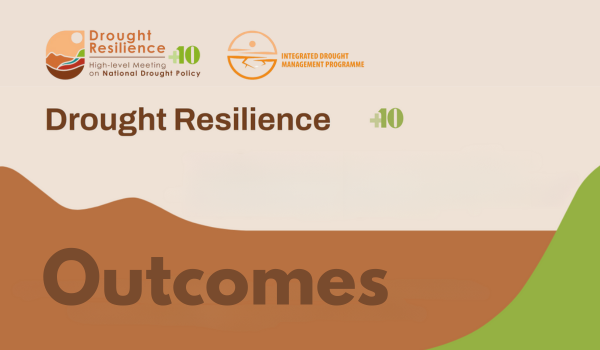The Drought Resilience +10 Conference held on 30 September-2 October 2024 convened nearly 1,000 experts, policymakers, and practitioners from 123 countries to assess the progress made over the past decade and discuss the way forward. As part of this global effort, GWP led discussions on social inclusion and public-private partnerships, emphasising the necessity of gender equality and proactive community involvement in the journey toward drought resilience. GWP reaffirmed its commitment to the goals of IDMP and reiterated its intention to continue driving inclusive and collaborative solutions for global drought resilience.
GWP's role in shaping future actions
GWP has long been committed to supporting drought resilience efforts across the globe. As GWP's Executive Secretary Alan AtKisson stated, “We have seen, over the past decade, how effective collaboration across sectors has been crucial to the success of IDMP. GWP is committed to continuing this work, tackling the complex challenges of drought and water scarcity, and supporting inclusive, data-driven, and effective drought resilience strategies worldwide.”
As Alan AtKisson further affirmed, “GWP remains steadfast in its determination to support drought resilience efforts globally through IDMP.”
Key Outcomes and Recommendations from the Conference
Discussions at the conference were structured around nine key themes, which addressed the central challenges and opportunities for building drought resilience globally. The conference issued a series of recommendations aimed at shaping global drought policy and action over the next decade. These recommendations include:
- Strengthening Global Alignment on Drought Resilience: There is an urgent need to align international efforts on drought risks with global frameworks like the Paris Agreement, the Sendai Framework, and the Sustainable Development Goals (SDGs).
- Reinforcing Drought Risk Governance: Drought risk management must shift towards an integrated systems approach, embedding sustainable land management and integrated water resources management into national and regional drought policies.
- Enhancing Drought Monitoring and Forecasting: There is a call for improved monitoring, impact assessments, and forecasting systems to better track cascading and compounding impacts, including fast-moving flash droughts.
- Moving from Policies to Action: All stakeholders are encouraged to mobilise resources, catalyse political will, and operationalise national drought plans that are proactive, prospective, and integrated across all levels.
- Prioritising Ecosystems in Drought Resilience Strategies: Strategies should focus on protecting ecosystems, water quality, groundwater management, and aquatic habitats to enhance resilience.
- Promoting Social Inclusion and Climate Justice: The conference underscored that marginalised groups—including women, youth, Indigenous Peoples, and remote communities—are disproportionately affected by drought, and called for gender-transformative, whole-of-society approaches to be integrated into national drought policies.
- Drought Finance: Stakeholders were encouraged to increase financial flows into drought resilience projects, with a focus on innovative financing mechanisms, private sector engagement, and youth-friendly funding.
- Public-Private-Civil Society Partnerships: The conference highlighted the need for new, innovative partnerships between public, private, and civil society sectors to drive progress.
- Health Considerations: There was an emphasis on preparing public health systems to address drought-associated health risks by improving understanding of how drought impacts health determinants such as the environment, economy, and society.
Key takeaways and looking forward
Key points stressed during the discussions included:
- The necessity of integrated, proactive, and perspective drought management.
- The integration of cross-sectoral and whole-of-society approaches into national drought policies.
- The importance of strengthening data-sharing and monitoring systems.
- The recognition that drought action is central to sustainable development, climate adaptation, and Early Warnings for All.
- The critical need to mobilise resources and strengthen political will for drought resilience.
As we move forward, the Integrated Drought Management Programme and the International Drought Resilience Alliance (IDRA) will play a key role in scaling up efforts to improve global drought resilience. A particular focus will be on transboundary cooperation, public-private partnerships, and the integration of drought resilience into global climate adaptation strategies.
The outcomes of the Drought Resilience +10 Conference will continue to inform global drought policy and will play a pivotal role in high-level discussions at the UNCCD COP16 in December 2024, where drought resilience will be a central theme.
Join us in shaping the future of drought resilience
The recommendations from the conference serve as a roadmap for how we can collectively address the global threat of drought. As co-sponsors of the Integrated Drought Management Programme, GWP remains committed to supporting inclusive, collaborative solutions to build drought resilience worldwide.
To access all materials, recordings, and presentations from the Drought Resilience +10 Conference, please follow this link.

